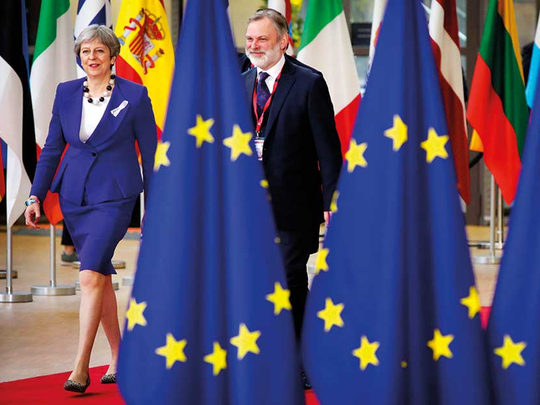
MADRID: Tick. Tick. Tick. A year from now, you will remember what you were doing — March 29, 2019 is one of those dates that will go down in history as potentially world changing.
It’s the day — at 11pm London time to be exact — when the United Kingdom’s decision to leave the European Union takes effect, setting the political and economic union into new territory, with the island nation sailing alone once more in uncharted waters.
For Brexiteers, March 29 next year can’t come around quick enough, even though the divorce negotiations between Britain and Brussels have been slow going.
- David Davis | UK’s minister for exiting the EU
“Negotiating such a seismic change was never going to be easy, and so that has proved,” David Davis, the UK’s minister for exiting the EU, noted on Tuesday. “But the fact that three-quarters of the text is now locked down and agreed shows how far the UK and the EU have come. Leaving the EU isn’t about short-term gains — it’s about taking back control of our laws, money and borders.”
And he’s eagerly looking forward to the next year.
“We can now start looking to the future, beyond March 2019, to a strong partnership built on a shared desire to look after the interests of our people, our businesses and our continent,” Davis said.
If he’s bullish, Remainers are equally bearish.
Britain’s opposition Labour Party is now demanding that parliament have the final say on the government’s Brexit deal, including an option to send ministers back to the negotiating table rather than leave without an exit agreement.
After reaching a deal last week on a transitional period lasting until the end of 2020, Prime Minister Theresa May’s team under Davis must now negotiate Britain’s long-term trading arrangements with Brussels — perhaps the hardest stage yet in the complicated divorce talks.
- Keir Starmer | Labour’s Brexit policy chief
May’s government has promised to put that final deal to parliament for approval, but has made clear the choice is either to accept the exit agreement, or leave without a deal.
Labour’s Brexit policy chief Keir Starmer is calling for a different approach.
“If Parliament rejects the terms of the Prime Minister’s deal that would not give her licence to crash out without an agreement. Far from it: that would be the worst of all possible worlds,” he said in Birmingham.
In a separate speech, former Labour prime minister Tony Blair, whose centrist views are at odds with the current left-wing leadership of Jeremy Corbyn, will urge parliament to go further and insist on a referendum on accepting the deal.
A so-called ‘No Deal’ exit would likely cause upheaval on financial markets, throw cross-border trade into confusion, and spark a political crisis in the world’s sixth largest economy.
Labour will seek to give parliament more options — including a return to Brussels for fresh talks — by amending the legislation that will end Britain’s EU membership on March 29, 2019.
As the year countdown clicked over, Prime Minister May is marking the day by travelling across Britain to meet families, discussing what the change will mean to them.
It will be followed in coming weeks by a series of visits by Cabinet ministers. Philip Hammond, the Chancellor, will travel to financial services communities in Leeds, Edinburgh, Bristol and London.
Michael Gove, the Environment Secretary, will meet fishermen on a coastal tour and travel to farming communities. His meetings with fisherman could be particularly heated after the government conceded that Britain will not have control of its waters during a transition period after Brexit.
Chris Grayling, the Transport Secretary, will talk to those working in aviation, rail and the haulage industry about how Brexit will work for them.
A Downing Street source said: “It is equally important that we spend the months leading up to Brexit strengthening our own union of nations.
“In 12 months, we will be leaving the EU and as that becomes real for people it is right that they will be asking what Brexit means for them.
— With inputs from agencies












